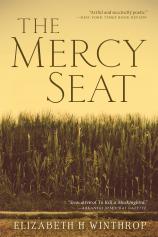The Mercy Seat
Review
The Mercy Seat
In an afterword to THE MERCY SEAT, Elizabeth H. Winthrop reveals that part of the novel’s genesis arose from listening to an episode of the podcast “The Radio Diaries” about the execution of a man named Willie McGee and of the traveling electric chair (known as “Gruesome Gertie”) that was the means of execution. This book is actually based on the story of two Willies --- both black men in the Jim Crow South, accused of crimes and sentenced to death. But rather than write straight history, Winthrop demonstrates the power and purpose of historical fiction, as she uses the historical facts to craft a story whose emotional heft will resonate with readers even today.
"Winthrop uses historical details to craft a narrative of immense emotional impact and relevance to today’s world."
The doomed man at the center of THE MERCY SEAT is another Willie, accused of raping the white daughter of a man for whom he worked. Willie’s own recollections make it clear that his relationship with the young woman was consensual and that the two were in love. However, since she took her own life after Willie’s arrest, Grace is not around to defend her lover. Another key figure is Polly, the recently elected district attorney who convicted Willie. Married to a Yankee wife and accused of being overly liberal toward black people, Polly feels constrained by the law, especially when certain figures in town start to threaten his young son with violence. Polly has seen firsthand the violence of so-called mob justice, and he’s determined that the legal process can offer a better alternative.
In addition, Winthrop’s story weaves together nearly a dozen other perspectives, from Polly’s wife and son to the priest who ministers to the convicted Willie to the convict who’s responsible for transporting and installing the traveling electric chair, the “mercy seat” of the title. Willie’s father also has a voice, as do a married pair of gas station owners whose own son is overseas fighting in World War II.
A common theme running throughout the book is the heartbreak and injustice of parents outliving their own children. Deep-seated prejudice and the violence it engenders, grace and mercy in unlikely places, and the phenomenon of the world getting worse instead of better --- these also run through the pages of Winthrop’s slight yet moving novel. Short chapters and overlapping perspectives give readers a portrait of a small community mired in its own hatred and short-sightedness, perhaps as doomed as the condemned man at the story’s center.
THE MERCY SEAT may prompt some readers to research the historical precedents inspiring the story, but in this case, the novel may be even greater than the sum of its parts, as Winthrop uses historical details to craft a narrative of immense emotional impact and relevance to today’s world.
Reviewed by Norah Piehl on May 11, 2018
The Mercy Seat
- Publication Date: April 16, 2019
- Genres: Fiction, Historical Fiction
- Paperback: 272 pages
- Publisher: Grove Press
- ISBN-10: 0802129617
- ISBN-13: 9780802129611




